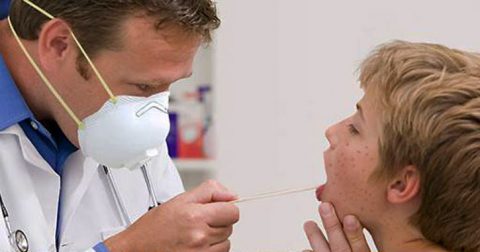 Nashville, TN – The Shelby County Health Department, supported by staff members from the Tennessee Department of Health, continued work throughout the weekend to prevent the spread of measles.
Nashville, TN – The Shelby County Health Department, supported by staff members from the Tennessee Department of Health, continued work throughout the weekend to prevent the spread of measles.
SCHD and TDH Friday reported two cases of the disease in Shelby County; as of today the case count for those meeting the case definition for measles has increased to six. All are in Shelby County.
“As a highly contagious and sometimes serious disease, measles infects approximately 20 million worldwide each year,” said TDH Commissioner John Dreyzehner, MD, MPH.

Upon confirmation of the first two cases of measles in Shelby County, public health staff members began the important work of ‘contact tracing,’ which involves identifying anyone who may have come in contact with patients diagnosed with measles.
“Contact tracing is our most important activity now, allowing us to quickly help those who may have been exposed to infections and to prevent others from becoming infected,” said SCHD Director Alisa Haushalter, DNP, RN. “We have contacted hospitals, physicians and neighboring counties to keep them updated on this evolving situation.”
Memphis area residents with questions or concerns may call the Shelby County Health Department Measles Hotline: 901.222.9299.
SCHD and TDH staff members encourage all Tennesseans to have heightened awareness about measles and its symptoms. Measles usually starts with a fever and a cough, runny nose and red eyes. A rash of tiny red spots then breaks out a few days after the fever, starting at the head and spreads to the rest of the body.
This rash can last for a week; the cough can last for several days more. One in three patients will develop ear infections, diarrhea or pneumonia. In some instances measles can cause brain damage and death.
SCHD and TDH urge those who are notified by health department staff members about their possible exposure to measles to call ahead to their healthcare provider and make arrangements to receive the measles vaccine if they do not have records of measles vaccination. There may be an opportunity, even after exposure to the measles virus, to prevent it from occurring by getting the vaccine.
Those who are notified of being exposed should call their healthcare provider first to make arrangements to receive the vaccine; if they are already ill with a fever or other measles symptoms, they should discuss with their clinician before coming to the clinic so they can be evaluated without exposing others to infection.
“If you or your child has fever and rash, it’s very important to call ahead to speak with your healthcare provider; do not go straight to the clinic without calling first,” said Kelly Moore, MD, MPH, Tennessee Immunization Program Director. “Your healthcare provider can arrange to see you in an area where other patients will not be exposed to possible infection. Tell him or her about any recent international travel, your exposure to others who have recently traveled internationally or if you have been in Shelby County in the past three weeks.”
SCHD and TDH both advise the best protection against measles is the measles-mumps-rubella, MMR, vaccine. MMR vaccine is safe and effective, and provides long-lasting protection against the measles virus. One dose protects about 19 of 20 people; two doses protect even more. People who have had the disease once are normally protected for life.
Those who are in doubt about their immunization history and were born in 1957 or later should have a conversation with their healthcare provider about vaccine. Protecting yourself helps form a ‘measles barrier’ to prevent the spread of illness to those who are most vulnerable, including those who are too young to be immunized or those with compromised immune systems.
SCHD and TDH also advise the best ways for individuals and families to protect themselves include:
- Babies should receive the first measles vaccine on or just after their first birthday. Children older than 12 months of age who have not yet received a measles vaccine (given as MMR) should be vaccinated as soon as possible.
- Ensuring everyone in the family is immune is the best way to protect children younger than one year of age who are too young to receive the MMR vaccine. Most babies are protected by their mother immunity in the first few months after birth.
- Two doses of measles vaccine are recommended for children and adults in high risk settings, such as healthcare facilities, schools and colleges. Children usually get the second measles shot at four to six years of age before going to school, but this dose can be given as little as one month after the first dose, if preferred.
- In general, adults born in 1957 or later who have never had measles or MMR vaccine should receive at least one dose of MMR.
- People who work in healthcare settings where they have contact with patients should have had two doses of MMR or laboratory proof of immunity, regardless of their age.
- Vaccinations are very safe and are the only way to ensure protection against measles. The benefits far outweigh any risks. Side effects are usually mild, such as soreness where the shot was given. One dose provides a high level of immunity, about 93 percent, while two doses provides more than 97 percent protection.
- In addition to being protected at home, be sure you and your family are fully vaccinated prior to international travel: measles is not uncommon in many other countries. If infants must travel, they can receive a dose between 6 and 11 months that may provide some protection. They then need to get vaccinated as normal at 12-15 months and then again at school entry, age 4-6.
- The MMR vaccine is available from many primary care providers, from the Shelby County Health Department and from other health departments across Tennessee.
- People who are not immune to measles and are exposed to the virus have a high probability of getting sick unless they are vaccinated within 72 hours of exposure.
- People who are exposed and unable to be vaccinated or are vaccinated late may need to limit being around people, especially infants and patients in healthcare settings, who might be vulnerable to measles.
- People with measles can make others sick for about four days before and four days after the day the rash starts.
- A person can start to get sick between seven and 21 days after being exposed to the measles virus. Most infected people will start seeing the rash about two weeks after being exposed.
For more information about measles, visit: www.cdc.gov/measles/index.html



